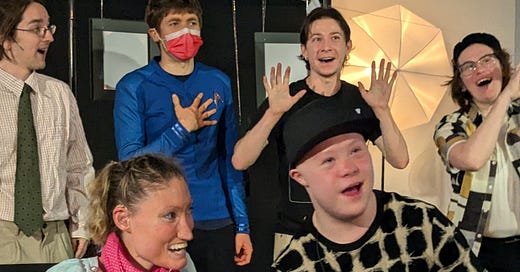In last month’s Q&A with some of the staff at Courage House, I wrote about the importance of hearing people’s stories in their own words. Here’s what I wrote at the time:
The reason I do a Q&A for the second part of my newsletter’s four-part series is so my subscribers can read the parts of the interviews that didn’t quite fit into the narrative of the other three parts of the story, and to see — at least a little bit — the people I have seen.
In writing these Q&As, I’ve been asking the subjects of my newsletters the same five questions, and I love hearing their answers. They can be fun — especially when I ask what they would do with $1 million; sweet — like when they tell me the things they enjoy doing with the people they love; and compelling — when I learn about the causes they care about and where their values lie.
When I asked the Pink Umbrella actors my five questions, I heard all of the fun, sweet, and compelling answers I expected. But the emotion behind one of Pip Buffington’s answers — and their real fear — felt different. I’d like to highlight those emotions by starting out this week’s newsletter with Pip’s answer.
First, some context
In April, Health and Human Services Secretary Robert F. Kennedy, Jr. said of kids with autism, “These are kids who will never pay taxes. They’ll never hold a job. They’ll never play baseball. They’ll never write a poem. They’ll never go out on a date. Many of them will never use a toilet unassisted.”
Such characterizations have raised concerns among autistic people and their advocates. A spokesperson later said that Kennedy’s comments only referred “to those that are severely affected by this chronic condition” and that “this was in no way a general characterization.” Even so, autism advocates have pointed out that comments like these dehumanize all autistic people with the implication that they are not as valuable to society due to their disability.
Kennedy’s understanding of autism as a disease that needs to be eliminated also contradicts many autistic people’s experience that autism is a brain difference which is a core part of their identity. That’s in addition to his statements indicating he believes autism might be caused by vaccines — a claim that has been repeatedly debunked; and his expectation that his department will produce a study within a few months to determine the cause of autism — an unrealistically short timeline for a comprehensive study. Many people within the autism, medical, and scientific communities fear that such a report — with the backing of a government department — would further spread misinformation about autistic people and, in the process, cause them harm.
Adding to these fears, the department announced that they would collect federal and private health data to support the study of autism, and National Institutes of Health director Jay Bhattacharya said the institute would create a “disease registry” focused on autism. Although the Health and Human Services department walked back those comments, saying they are not creating a registry but rather a “real-world data platform,” autistic people and advocates continue to be concerned about the privacy of their data, how the data would be collected, and how it will be used.
‘We’re still people’
Here’s what Pip had to say when I asked them one of my five questions, “What’s the biggest challenge or obstacle in your life, and how do you deal with it?”
Transitions between things, whether that’s small things like getting from one activity or errand to another, or big things, like how do I get my kid ready to go to preschool next year, any kind of microcosmic or macrocosmic transition is hard.
Unfortunately, we’ve had a lot of transitions lately. I think that the entire state of the world being in constant flux with not a lot of knowledge of what will happen — to me, that’s the scariest transition.
Like, if there is an autism registry made, will I be seen as an unfit parent? Would they take me from my kid? That’s not something I want to think about, but it’s something I think I have to prepare for.
I don’t think people understand the depths of the fear that I have for that happening, how I have to talk myself off the ledge, how I wonder if people will spot the stiltedness of my movements when I’m out in public, how I wonder if they will notice something about me and report me.
Is somebody going to report me because of who I am and what I am? Anyone who moves or talks or looks like me is suspect, and I don’t know how you deal with that.
Thankfully, those things haven’t happened yet, and I can take comfort in it not happening right now. But there are people who don’t think of us as parents, as siblings, as productive members of society, and many of us are.
But even if we’re not, we’re still people, and we have people who would miss us and care about us. We have emotions and feelings, and it shouldn’t matter how productive I am or who’s going to miss me. Every one of us is worth it.
Here’s how Pip and their castmates responded to the rest of my questions.
Keep reading with a 7-day free trial
Subscribe to Learning from their Stories to keep reading this post and get 7 days of free access to the full post archives.





